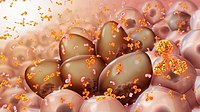
Photo from wikipedia
Background & Aim Clinical success of CART cells targeting CD19 has led to FDA approval for a wide-range of hematological malignancies. Despite these achievements, CARs have lacked efficacy in the… Click to show full abstract
Background & Aim Clinical success of CART cells targeting CD19 has led to FDA approval for a wide-range of hematological malignancies. Despite these achievements, CARs have lacked efficacy in the treatment of solid tumors due to a number of challenges, including overcoming the dense immunosuppressive tumor stroma and post-translational modifications on the tumor that favor survival. Our work aims to improve CART cell therapy against solid tumors by targeting the tumor-specific glycoepitope Tn-MUC1, and enhancing cytotoxic effects of endogenous and unmodified immune cells by engineering sialidase function on CART cells. Previous studies have demonstrated precedence for this approach showing that coupling current immunotherapies with glycoediting activity increases therapeutic efficacy. For example, CART cells engineered to express heparanase showed an improved degradation of the extracellular matrix, which promoted T cell infiltration of the tumor and antitumor activity. Additionally, sialidase activity coupled to trastuzumab enhanced endogenous NK anti-cancer efficacy. Methods, Results & Conclusion Here, we present a cellular therapeutic approach where we designed a novel cell-surface human sialidase and expressed it on CART cells targeting Tn-MUC1. Truncated, cancer-specific glycoforms, such as Tn-MUC1, are thought to play a role in decreasing cell-cell interactions and increasing the metastatic potential of cancer cells. We established that Tn-MUC1-CART (or 5E5-CART) cells induce minimal cytotoxic effects against the aggressive PC3 prostate cancer cell line, when co-cultured alone at equal effector:target ratios. When PC3 cells are treated with a Clostridium perfringens-derived sialidase, NK cells and 5E5-CART cells show enhanced IFN-γ production and improved cytotoxic effects are observed compared with NK cells and 5E5-CART cells alone. Similarly, these effector enhancements are observed in the presence of T cells presenting a human cell-surface sialidase. Taken together, these data suggest that glycoediting of tumor sialic acid presents a rational and unique opportunity to overcome barriers for adoptive immunotherapies in solid tumors, and engagement of the endogenous immune system by adoptively transferred cells is an effective strategy for improved anti-tumor activity.
Journal Title: Cytotherapy
Year Published: 2019
Link to full text (if available)
Share on Social Media: Sign Up to like & get
recommendations!